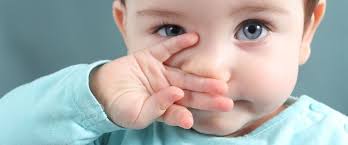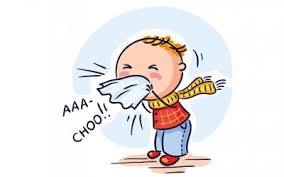What you need to know if your child has bronchiolitis

Bronchiolitis is a disease that affects younger children, especially those of a few months, usually caused by some very common and not very dangerous viruses for adults. Often parents or siblings have only a cold. The symptoms of bronchiolitis are: cough, fever and difficulty breathing.

- How is it treated?
There are no specific cures for bronchiolitis! To help your baby breathe better, we recommend:
– wash the nose with hypertonic solution;
– perform aerosols with hypertonic solution;
– offer smaller than usual but more frequent meals.

- When should the child be hospitalized?
When you have difficulty breathing and when you are unable to eat enough. Hospitalization can be used to administer oxygen and / or liquids with an IV or tube. These therapies are called “supportive” because there are no specific treatments for bronchiolitis!

- What do you need to check at home?
The most important thing is to check how the child breathes: see if he breathes very quickly and if there are “indentations” under the chest. During the visit, the pediatrician will explain how to do it. Also observe your child’s behavior: it is normal for him to be less lively than usual, but if in doubt, contact the pediatrician. Try to understand how much your baby eats. If the baby is breastfed it can be helpful to check your weight in the morning to make sure it doesn’t drop. Sometimes it can be useful to pull the mother’s milk and propose it with the bottle to less tire the child during the meal.

- How is the bronchiolitis virus contracted?
The virus that causes bronchiolitis most frequently is called respiratory syncytial virus. This virus spreads easily from person to person. When a person with the virus coughs or sneezes, it releases tiny particles that contain the virus into the air. If these particles are breathed or deposited on the mouth or eyes, they can be infected. The same thing happens if you touch objects on which these particles have settled and then you touch your mouth or nose or eyes.
- How can you prevent your child from taking bronchiolitis?
– Wash your hands before touching or picking up the baby and ask others to do the same.
– Do not touch your eyes, mouth or nose while caring for the baby.
– Ask those who sneeze or cough not to get close to the baby, to put their hands in front of the mouth and to wash their hands frequently.
– Clean potentially contaminated surfaces (high chair, toys, door handles).
– Do not expose your child to secondhand smoke.
Taken from Pediatric Area volume 18 n. 4 October-December 2017
We just couldnt leave your site before saying that I genuinely enjoyed the quality information you provide to your visitors? Will be again soon to check up on new posts
he blog was how do i say it… relevant, finally something that helped me. Thanks
I am impressed with this website , really I am a big fan .
Great line up. We will be linking to this great article on our site. Keep up the good writing.
I’m still learning from you, as I’m making my way to the top as well. I definitely liked reading everything that is written on your website.Keep the stories coming. I liked it!
Good web site! I truly love how it is simple on my eyes and the data are well written. I’m wondering how I might be notified when a new post has been made. I have subscribed to your RSS which must do the trick! Have a nice day!
I also believe that mesothelioma cancer is a extraordinary form of cancers that is generally found in individuals previously familiar with asbestos. Cancerous tissues form while in the mesothelium, which is a safety lining that covers the majority of the body’s areas. These cells normally form in the lining from the lungs, stomach, or the sac that encircles the heart. Thanks for revealing your ideas.
Hiya very nice blog!! Man .. Beautiful .. Wonderful .. I will bookmark your blog and take the feeds also?I am happy to seek out numerous helpful information here within the post, we want develop extra techniques on this regard, thank you for sharing. . . . . .
I was just seeking this info for some time. After six hours of continuous Googleing, finally I got it in your web site. I wonder what’s the lack of Google strategy that do not rank this type of informative websites in top of the list. Usually the top sites are full of garbage.
Just desire to say your article is as surprising. The clearness to your put up is simply cool and that i could assume you are a professional in this subject. Fine along with your permission allow me to grasp your feed to keep updated with drawing close post. Thanks one million and please carry on the enjoyable work.
I am often to blogging and i really appreciate your content. The article has really peaks my interest. I am going to bookmark your site and keep checking for new information.
Good post. I study something more challenging on completely different blogs everyday. It would at all times be stimulating to learn content material from different writers and practice just a little something from their store. I?d prefer to use some with the content on my weblog whether or not you don?t mind. Natually I?ll provide you with a link in your internet blog. Thanks for sharing.
Good day! Do you use Twitter? I’d like to follow you if that would be ok. I’m undoubtedly enjoying your blog and look forward to new updates.
Thanks for the sensible critique. Me & my neighbor were just preparing to do a little research on this. We got a grab a book from our local library but I think I learned more clear from this post. I’m very glad to see such fantastic information being shared freely out there.
Howdy I am so excited I found your weblog, I really found you by mistake, while I was browsing on Aol for something else, Anyways I am here now and would just like to say thanks for a fantastic post and a all round exciting blog (I also love the theme/design), I don’t have time to look over it all at the minute but I have saved it and also included your RSS feeds, so when I have time I will be back to read more, Please do keep up the fantastic work.
Hello there, You’ve performed a great job. I will certainly digg it and in my view suggest to my friends. I’m sure they will be benefited from this website.
I believe that avoiding processed foods is the first step to lose weight. They could taste fine, but processed foods currently have very little vitamins and minerals, making you eat more just to have enough vigor to get over the day. For anyone who is constantly consuming these foods, transferring to whole grains and other complex carbohydrates will assist you to have more electricity while having less. Great blog post.